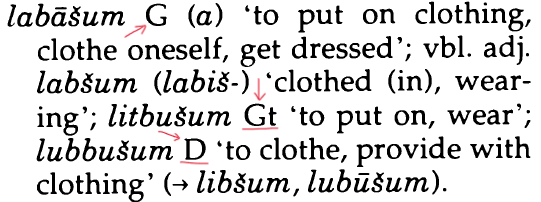L2.3: G-Stamm
Contents
L2.3: G-Stamm#
The G-Stamm is the base stem. It has no formative element.
Good-to-know
The letter G comes from the German “Grundstamm”, which means “base stem”
Non-finite forms#
Non-finite forms are nominal forms and declinable. There are three of them: Infinitive, Participle and Verbal Adjective
Infinitive#
The infinitive is morphologically a noun and is inflected as such.
Nominal Form
parās
This is also the citation form of a verb not only today but already in antiquity. That means that all other stems are subsumed after the G-stem
Entry in a Dictionary
In this picture you can see that the other stems are within the entry labāšu, which is in the G-Stem.

Infinitive |
Translation |
|---|---|
mahāṣum |
to strike |
damāqum |
to be/to become good |
ṣabātum |
to seize, arrest, capture |
Participle#
It is similar to an adjective and as such it has masculine and feminine forms with singular and plural and cases.
Nominal Form
pāris (masc.), pārist (fem.)
It always has an active meaning:
Number |
Case |
Masculine |
Feminine |
|---|---|---|---|
sg. |
nom. |
pārisum |
pāristum |
gen. |
pārisim |
pāristum |
|
acc. |
pārisam |
pāristum |
|
pl. |
nom. |
pārisūtum |
pārisātum |
gen./acc. |
pārisūtim |
pārisātim |
Warning
Verbs that describe a state like marāṣu “to be/become sick” can not have a participle.
The particple can be translated with a relative sentence, an agent noun or a noun of occupation.
Infinitive |
Translation |
Particple |
Relative clause |
Agent/Occupation noun |
|---|---|---|---|---|
paqādum |
to entrust |
pāqidum |
the one who cares |
carer, inspector |
mahāṣum |
to beat, strike |
māhiṣum |
the one who beats |
beater |
zanānu |
to provision, provide (for, with) |
zāninu |
the one who provides |
the provider |
It can also accommpany a noun. In that case it is translated into English with the ending “-ing”, also known as the gerund.
Infinitive |
Translation |
Noun + Particple |
Translation |
|---|---|---|---|
mahāṣum |
to beat, strike |
kakkum māhiṣum |
the smiting weapon |
ṣabātu |
to seize, take, hold |
šadânum (a stone) ṣābitum |
the “holding” stone = magnetite |
Good-to-Know 🤔
When you are not sure how to translate the particple, you can always translate it as a relative clause. Once you have translated the rest of the sentence, you can decide to translate it either as noun, relative sentence or adjectives einding “-ing”.
Verbal Adjective#
The verbal adjective describes attributes or states:
Nominal Form
paras (masc.), parast (fem.);
paris (masc.), parist (fem.);
parus (masc.), parust (fem.).
The masculines forms with ending parsum.
Infinitive |
Translation |
Verbal Adjective |
Translation |
|---|---|---|---|
damāqum |
to be/become good |
damqum |
good |
danānum |
to be/become strong |
dannum |
strong |
Active-transitive Verbs will always have a passive meaning:
Infinitive |
Translation |
Verbal Adjective |
Translation |
|---|---|---|---|
mahāṣum |
to beat, strike |
mahṣum |
beaten |
šarāqum |
to steal |
šarqum |
stolen |
Warning
Note that the short vowel i between R₂ and R₃ are not present. That is because short unstressed vowels between two consonants are often elided (👉parsum), unless a long vowel stands before the preceding consonant (👉 pārisum). This is also known as vowel syncope:
parsum (<*parisum) = Verbal adjective.
pārisum (remains unchanged) = Particple.
If the short vowel in question precedes an r, it will be sometimes be protected and wont be elide:
šikarum = “beer”.
laberum = “old”.
zakirum and zikrum = “man” both are attested.
